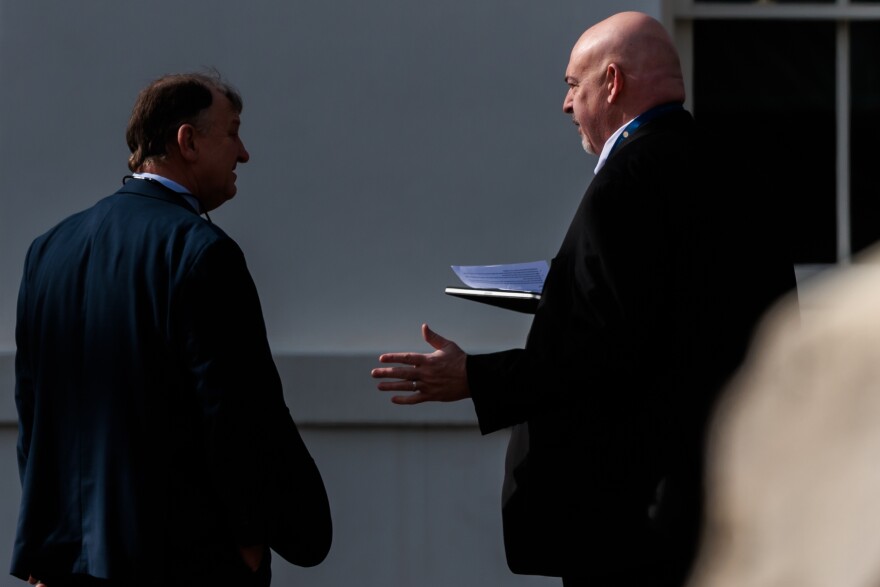Though the 2025 legislative session came to an end on Saturday, the General Assembly has more work to do as federal policy shifts promise to send shockwaves through Virginia’s workforce and economy.
The House Emergency Committee on the Impacts of Federal Workforce and Funding Reductions met for the first time Saturday morning.
And both the House of Delegates and state Senate continued a 2024 special session, leaving open the possibility of calling all legislators back to the Capitol with 48 hours’ notice to consider legislation and budget amendments.
Finishing business
Legislators in the House and Senate have been working overtime to compromise on about 100 bills that the two bodies disagreed on — most of those were heard and adopted on Saturday.
The statehouse also passed its amendments to the state budget — State Sen. Louise Lucas (D–Portsmouth) spoke in favor of it, while a handful of Republican legislators raised some objections, including removing Gov. Glenn Youngkin’s proposal to eliminate the car tax for some Virginians.
State Sen. Bill Stanley (R–Floyd) thanked the state’s budget negotiators for setting aside money for Southwest Virginia in the aftermath of Hurricane Helene.

“It is structurally balanced and supports a strong Virginia,” Lucas said.
The House of Delegates passed the budget 81-18. The Senate also passed it with a 37-3 vote.
The budget and all bills passed by legislators now heads to the governor’s desk for consideration.
“This General Assembly is sending me a multitude of bills, including a budget, and over the next 30 days I will go to work to review and take action on those bills and budget,” Youngkin said in a statement. “We will have much to address at the reconvene session, but I remain grateful for the hard work of our General Assembly members and their staffs."
But big changes could be coming from Washington.
A new committee and a special session
Members on the bipartisan House Emergency Committee heard presentations on potential impacts from federal workforce reductions and funding cuts.
“We are here today because federal workforce reduction and cuts in spending not only affect the ability of individual families to support themselves, it's also going to have a ripple effect on our economy and affect our state budget,” said Del. David Bulova (D–Fairfax), who chairs the new committee.
Clark Mercer, executive director of the Metropolitan Washington Council of Governments, said estimates of 140,000-190,000 federal jobs based in Virginia likely underestimate the amount of federal workers in the state.
Given 2023 Census data, Mercer pointed to an estimate of 315,000 federal workers in the state — working in Virginia, Washington and Maryland, or remotely.
Legislators also received a rundown of potential impacts to the state budget.
According to data presented by House Appropriations Committee analyst Kim McKay, more than one quarter of Virginia’s spending in FY24 was supported by federal funding.
Medicaid receives the biggest chunk of that federal input — $14.6 billion in FY24. Public education aid came second at $2.5 billion, while higher education, social services and transportation all followed at $1.4 billion each.
The U.S. government also makes direct payments to Virginians — such as $38.1 billion for Medicaid — and federal contracts in localities — such as $41.4 billion to Fairfax County.
Responding to a question from Del. Tony Wilt (R–Rockingham) about how the state had handled previous shifts in economic inputs, McKay said in the 2008 financial crisis, the legislature passed a single budget amendment that cut spending in programs across the board.

“It was essentially gutting core services to be able to mitigate the impacts of the Great Recession,” McKay said.
The 2008-2010 biennial budget saw a general fund shortfall of $3.7 billion.
The legislature at large set itself up to return to the Capitol on short notice.
The legislature switched between sessions multiple times Saturday. In regular session, they worked to pass the remaining bills and the state budget and adjourned.
And in an interesting application of General Assembly rules, lawmakers also met in a continuation of the 2024 special session they never technically adjourned. Special sessions can run indefinitely, and allow the legislature to set meetings rather than relying on the Governor to call a session.
By passing a new resolution, the legislature established a new focus for the special session, allowing them to quickly consider any:
- Budget Bill or revenue bill;
- appointments or elections of judges and other officials subject to the election of the General Assembly;
- Bill or joint resolution addressing the impacts upon the Commonwealth; its budget, and its services due to layoffs, firings or reductions in force by the federal government; changes to federal government programs; actions of the Department of Government Efficiency; and other actions affecting the Commonwealth relating to the federal budget
In closing the emergency committee meeting, Del. Rob Bloxom (R–Accomack), the co-chair, said the committee would try to look after Virginians in a rapidly changing landscape.
“All this is in flux,” Bloxom said. “We don’t know if they just cut funding across the board, or if they’re gonna change rules … we really just don’t know yet.”
Bulova said the committee planned to have four additional meetings over the first half of the year — one each in Northern Virginia, Hampton Roads, western Virginia and Richmond.
The General Assembly is scheduled to reconvene on April 2 to consider Gov. Youngkin’s actions.



